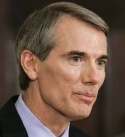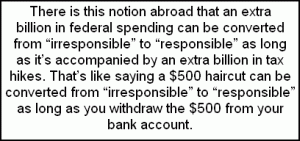A few scattered thoughts on the great compromise (numbered for the convenience of commenters, so you can easily say which part you’re responding to):
- There were never any such thing as a “Bush tax cut”. There were only tax deferrals. In the absence of spending cuts, lower taxes today mean higher taxes tomorrow. So all this talk about how, in the absence of an extension, the average family will pay so-and-so many more thousands in taxes — it’s sheer balderdash. We will collectively pay exactly the same amount in taxes, present and future combined, whether or not this extension goes through.
- Although the average long-run tax burden is unaffected, changes in the tax code can of course shift the burden from one class of taxpayers to another. The Bush “tax cuts”, for example, probably made the tax code somewhat more progressive, shifting the burden from the poor to the rich. (You might have heard the opposite, but I suggest paying more attention to numbers than to rhetoric.)














